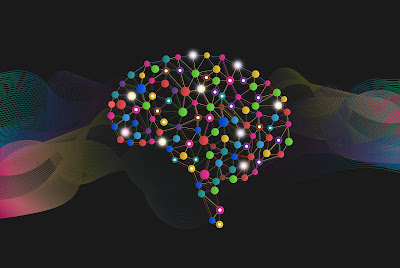The Complex Relationship Between Coffee and the Brain: A Neuroscientific Odyssey
The Complex Relationship Between Coffee and the Brain: A Neuroscientific Odyssey
Coffee is an integral part of the daily routines of millions
around the world. Its rich aroma and bold flavors make it a cherished beverage,
but beyond these sensory pleasures lies a complex relationship with the brain.
In this article, we delve deep into the world of coffee and its effects on the
brain, both the good and the bad.
The Neurological Upsides of Coffee
Cognitive Function Enhancement
The most celebrated effect of coffee on the brain is its
ability to boost cognitive function. Caffeine, a natural stimulant found in
coffee, plays a pivotal role in this enhancement (Souissi et al., 2019)
(McLellan et al., 2016). Caffeine works by acting as an antagonist and blocking
adenosine receptors (Zhang et al., 2020) (Dunwiddie & Masino, 2001). Adenosine is a substance in your body
that promotes sleepiness, and by targeting adenosine receptors, caffeine
increases alertness and attentiveness, making it easier to concentrate on tasks
and enhancing overall cognitive performance (Souissi et al., 2019) (McLellan et
al., 2016).
Mood Enhancement
Coffee doesn't just rouse the brain; it can also have a
positive impact on mood. Caffeine activates noradrenaline neurons and
influences the local release of dopamine (Nehlig et al., 1992). Dopamine is
known as "feel-good" chemicals, which can lead to increased feelings
of happiness and well-being.
Additionally, research has found that caffeine consumption
was associated with a reduced risk of depression (Navarro et al., 2018) (Min et
al., 2023). Although the link between coffee and mood is complex and may vary
from person to person, many coffee enthusiasts report feeling more content and
alert after their morning brew.
Neuroprotection
Recent research suggests that coffee may offer protective
advantages for the brain. Numerous studies indicate that regular coffee
consumption may reduce the risk of developing neurodegenerative disorders such
as Parkinson's disease, Alzheimer's disease, and cognitive decline, although
there have been conflicting findings in this area (Socała et al., 2021).
Moreover, research has demonstrated that moderate coffee intake could
potentially contribute to a decreased risk of dementia and improved cognitive
performance (Wasim et al., 2020) (Colombo & Papetti, 2020). Additionally,
habitual coffee consumption may also be associated with a reduced risk of
stroke and lower mortality rates (Kolahdouzan & Hamadeh, 2017) (Wasim et
al., 2020) (Patil et al., 2011). The neuroprotective benefits of coffee against
neurodegenerative conditions are believed to be linked to the antioxidant and
anti-inflammatory properties of caffeine (Socała et al., 2021).
The Neurological Downsides of Coffee
Sleep Disturbances
While coffee can be a boon to productivity during the day,
it can turn into a bane at night. Caffeine's ability to block adenosine, which
promotes sleep (Zhang et al., 2020), can disrupt sleep patterns if consumed too
late in the day or in excessive amounts. Sleep is essential for proper brain
function (See our previous blog article), and chronic sleep disturbances can
lead to cognitive deficits, mood disorders, and even long-term health issues
(Pearson et al., 2023). It is recommended to avoid caffeine-containing
beverages in the afternoon and evening to ensure a good night's sleep. However,
it's worth noting that sensitivity to caffeine varies among individuals, so
some may need to cut off caffeine consumption earlier in the day than others to
avoid sleep disruptions.
Anxiety
Coffee has the potential to induce feelings of anxiety and
nervousness in some individuals. Studies have revealed that caffeine, in doses
approximately equivalent to the caffeine content in roughly five cups of
coffee, can trigger panic attacks in a significant proportion of patients with
panic disorder (Klevebrant & Frick, 2022). Furthermore, caffeine has been
observed to raise anxiety levels in individuals, regardless of whether they
have panic disorder or not (Klevebrant & Frick, 2022). However, the exact
relationship between caffeine-induced anxiety and panic attacks remains a
subject of ongoing investigation (Klevebrant & Frick, 2022).
Dependency and Withdrawal
Individuals who frequently consume beverages containing caffeine may develop physical, emotional, and psychological dependence on this stimulant. Moreover, they might encounter caffeine withdrawal symptoms upon sudden cessation of its consumption (Sajadi-Ernazarova et al., 2023). Consistent caffeine intake leads to an increase in the number of adenosine receptors in the central nervous system (CNS), rendering individuals more responsive to adenosine's usual physiological effects (Sajadi-Ernazarova et al., 2023), further contributing to potential withdrawal symptoms such as headaches, fatigue, and irritability.
To safeguard against developing a strong dependency on
caffeine, it is crucial to consume coffee in moderation. Gradually reducing
caffeine intake or incorporating periodic breaks from coffee can effectively
mitigate withdrawal symptoms and promote a balanced and healthy relationship
with caffeine (Caffeine, n.d.).
Moderation is the Key
Considering its intricate effects on the brain, it is crucial to establish a balanced relationship with coffee that centers on moderation. Finding the optimal equilibrium between harnessing coffee's benefits and minimizing its potential drawbacks holds great importance. The concept of "moderation" can vary from person to person, influenced by factors such as genetics, age, and overall health. Nevertheless, as a general guideline, the U.S. Food and Drug Administration considers a daily caffeine intake of 400 milligrams safe for healthy adults, which is roughly equivalent to four cups of brewed coffee (with one cup being approximately 8 ounces) (Caffeine, 2020). For pregnant women, it is advisable to limit their caffeine consumption to 200 mg per day, approximately equivalent to two cups of brewed coffee, as recommended by the American College of Obstetricians and Gynecologists (Caffeine, 2020). Maintaining moderation remains fundamental when navigating the intricacies of coffee's impact on the brain.
Conclusion
The relationship between coffee and the brain is multifaceted, holding both promise and potential pitfalls. Caffeine presents opportunities for cognitive enhancement, mood improvement, and potential neuroprotective effects, making it an exciting area for neuroscience research. However, it is equally important to recognize the risks associated with excessive coffee consumption, including disruptions in sleep patterns, heightened anxiety, and the possibility of dependency. As ongoing neuroscience research delves deeper into the impact of coffee on our neural networks, we will gain a more comprehensive understanding of its effects. In the meantime, maintaining a harmonious relationship with coffee requires mindfulness and moderation. Enjoy your cup of coffee, but do so with awareness of both your brain's needs and your individual tolerance levels.
References
Caffeine (2020). The Nutrition Source. School of Public Health. Harvard. https://www.hsph.harvard.edu/nutritionsource/caffeine/
Caffeine: How Long it Lasts, How Much & Withdrawals. (n.d.). Cleveland Clinic. https://my.clevelandclinic.org/health/articles/15496-caffeine-how-to-hack-it-and-how-to-quit-it
Colombo, R., & Papetti, A. (2020). An Outlook on The Role of Decaffeinated Coffee in Neurodegenerative Diseases. Critical Reviews in Food Science and Nutrition, 60(5), 760–779. https://doi.org/10.1080/10408398.2018.1550384
Dunwiddie, T. V., & Masino, S. A. (2001). The Role and Regulation of Adenosine in The Central Nervous System. Annual Review of Neuroscience, 24, 31–55. https://doi.org/10.1146/annurev.neuro.24.1.31
Klevebrant, L., & Frick, A. (2022). Effects Of Caffeine on Anxiety and Panic Attacks in Patients with Panic Disorder: A Systematic Review and Meta-Analysis. General Hospital Psychiatry, 74, 22–31. https://doi.org/10.1016/j.genhosppsych.2021.11.005
Kolahdouzan, M., & Hamadeh, M. J. (2017). The Neuroprotective Effects of Caffeine in Neurodegenerative Diseases. CNS Neuroscience & Therapeutics, 23(4), 272–290. https://doi.org/10.1111/cns.12684
McLellan, T. M., Caldwell, J. A., & Lieberman, H. R. (2016). A Review of Caffeine’s Effects on Cognitive, Physical and Occupational Performance. Neuroscience & Biobehavioral Reviews, 71, 294–312. https://doi.org/10.1016/j.neubiorev.2016.09.001
Min, J., Cao, Z., Cui, L., Li, F., Lu, Z., Hou, Y., Yang, H., Wang, X., & Xu, C. (2023). The Association Between Coffee Consumption and Risk of Incident Depression and Anxiety: Exploring the Benefits of Moderate Intake. Psychiatry Research, 326, 115307. https://doi.org/10.1016/j.psychres.2023.115307
Navarro, A. M., Abasheva, D., Martínez-González, M. Á., Ruiz-Estigarribia, L., Martín-Calvo, N., Sánchez-Villegas, A., & Toledo, E. (2018). Coffee Consumption and The Risk of Depression in a Middle-Aged Cohort: The SUN Project. Nutrients, 10(9), 1333. https://doi.org/10.3390/nu10091333
Nehlig, A., Daval, J. L., & Debry, G. (1992). Caffeine and the central nervous system: Mechanisms of Action, Biochemical, Metabolic and Psychostimulant Effects. Brain Research. Brain Research Reviews, 17(2), 139–170. https://doi.org/10.1016/0165-0173(92)90012-b
Patil, H., Lavie, C. J., & O’Keefe, J. H. (2011). Cuppa Joe: Friend or Foe? Missouri Medicine, 108(6), 431–438. https://pubmed.ncbi.nlm.nih.gov/22338737/
Pearson, O., Uglik-Marucha, N., Miskowiak, K. W., Cairney, S. A., Rosenzweig, I., Young, A. H., & Stokes, P. R. A. (2023). The Relationship Between Sleep Disturbance and Cognitive Impairment in Mood Disorders: A Systematic Review. Journal of Affective Disorders, 327, 207–216. https://doi.org/10.1016/j.jad.2023.01.114
Sajadi-Ernazarova, K. R., Anderson, J., Dhakal, A., & Hamilton, R. J. (2023). Caffeine Withdrawal. In StatPearls. StatPearls Publishing. http://www.ncbi.nlm.nih.gov/books/NBK430790/
Socała, K., Szopa, A., Serefko, A., Poleszak, E., & Wlaź, P. (2021). Neuroprotective Effects of Coffee Bioactive Compounds: A Review. International Journal of Molecular Sciences, 22(1), 1. https://doi.org/10.3390/ijms22010107
Souissi, Y., Souissi, M., & Chtourou, H. (2019). Effects Of Caffeine Ingestion on The Diurnal Variation of Cognitive and Repeated High-Intensity Performances. Pharmacology, Biochemistry, and Behavior, 177, 69–74. https://doi.org/10.1016/j.pbb.2019.01.001
Wasim, S., Kukkar, V., Awad, V. M., Sakhamuru, S., & Malik, B. H. (2020). Neuroprotective And Neurodegenerative Aspects of Coffee and Its Active Ingredients in View of Scientific Literature. Cureus, 12(8), e9578. https://doi.org/10.7759/cureus.9578
Zhang, B., Liu, Y., Wang, X., Deng, Y., & Zheng, X. (2020). Cognition And Brain Activation in Response to Various Doses of Caffeine: A Near-Infrared Spectroscopy Study. Frontiers in Psychology, 11. https://www.frontiersin.org/articles/10.3389/fpsyg.2020.01393









Comments
Post a Comment